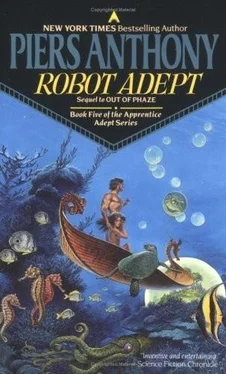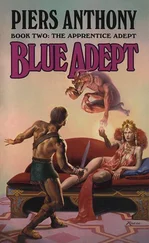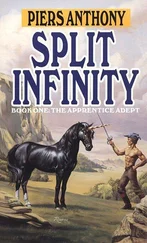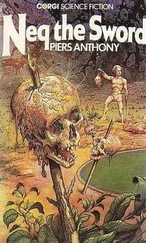Piers Anthony - Robot Adept
Здесь есть возможность читать онлайн «Piers Anthony - Robot Adept» весь текст электронной книги совершенно бесплатно (целиком полную версию без сокращений). В некоторых случаях можно слушать аудио, скачать через торрент в формате fb2 и присутствует краткое содержание. Год выпуска: 0101, Жанр: Фэнтези, на английском языке. Описание произведения, (предисловие) а так же отзывы посетителей доступны на портале библиотеки ЛибКат.
- Название:Robot Adept
- Автор:
- Жанр:
- Год:0101
- ISBN:нет данных
- Рейтинг книги:3 / 5. Голосов: 1
-
Избранное:Добавить в избранное
- Отзывы:
-
Ваша оценка:
- 60
- 1
- 2
- 3
- 4
- 5
Robot Adept: краткое содержание, описание и аннотация
Предлагаем к чтению аннотацию, описание, краткое содержание или предисловие (зависит от того, что написал сам автор книги «Robot Adept»). Если вы не нашли необходимую информацию о книге — напишите в комментариях, мы постараемся отыскать её.
Robot Adept — читать онлайн бесплатно полную книгу (весь текст) целиком
Ниже представлен текст книги, разбитый по страницам. Система сохранения места последней прочитанной страницы, позволяет с удобством читать онлайн бесплатно книгу «Robot Adept», без необходимости каждый раз заново искать на чём Вы остановились. Поставьте закладку, и сможете в любой момент перейти на страницу, на которой закончили чтение.
Интервал:
Закладка:
“Because you have no technology of your own,” Mach said.
“True. We had no need of it until we made contact with other species. Now we realize that we are retarded in this sense, and we wish to make progress. We prefer not to be entirely dependent on other planets for our interplanetary contacts.”
Mach could appreciate why. Any aggressive planet could exploit Moeba unmercifully, and surely in time that would occur. “So you are studying technology, and trying to learn sexual reproduction, so that your species will evolve as effectively as others do.”
“You have an unusual comprehension of our effort,” Coan remarked.
“I am not a normal individual of my species,” Mach said. “I am a machine—”
“I had noted that. But you are self-willed.”
“Who is in love with a living creature of another species.”
“I begin to perceive the nature of your empathy,”
“I also represent, in a manner, the interest of another individual who is in love with a Moebite, and who I believe would like to breed with her.”
Coan considered a moment. “I believe we have some common interest. We must explore it in greater detail.”
“Agreed.”
The bubble reached the shore and crawled onto land, then stalled; its fiber-propulsion was unable to sustain the weight on land. The port opened, and they climbed out.
Coan escorted him to a building that appeared to have been constructed by natives of another planet. That made sense; the Moebites had had no technological culture of their own. This was the limitation they were trying to surmount.
“In the beginning, our culture was without form and void,” Coan said, showing a setting of deep water. “We were amoeba, but small, floating in the current. We were victim to other species, and to each other. Predator species were dominant.” And in the setting, little amoeba were engulfed by larger ones.
“We retreated to the least hospitable realms, the shallows and the rivers,” Coan continued as they moved to the next exhibit. “Conditions were more extreme here, and we had to develop tougher membranes and tougher protoplasm. But the predators did the same, and followed us. We retreated to the fresh water, developing membranes to contain our vital solutions, and finally to the land itself.” The settings showed this progression.
“But here the climate was truly savage. No amount of fleshly adaptation could sustain us against the alternate desiccation of the summer sunlight and freezing of the winter. But we discovered how actually to shape our environment somewhat for our comfort, by Grafting deep pools in hollows on the land that the predators could not reach, or by walling off sea inlets so that predators had difficulty passing. Food was a serious problem on land, but we learned to cultivate simple cells and feed on them.
“The most important breakthrough was the development of linguistic communication. It enabled us to form, in effect, a larger entity, that was better able to cope with inclement conditions. We now dominate our planet, and no other species preys on us. But when the first shuttle from an alien planet landed, we realized that a great deal more remained to be mastered.”
“But how do you reproduce?” Mach asked.
“By fission. We grow to sufficient size, then divide into clone entities, each the same as the original.”
“But this should result in the continual fragmentation of the species,” Mach protested.
“No. When two of us have need, we flow together, and the dominant genes establish a new entity with traits of each of the contributors. Then we fission, and the clones are similar. This process maintains a unified species.”
“But each individual loses its identity when mergence occurs,” Mach protested. “A new individual is formed, a compromise creature.”
“Yes. This is why our leading scholars avoid mergence as long as possible. Unfortunately, mergence is our nature; aging and weakening occur if it is postponed too long. Thus we are unable to maintain a truly discrete intellectual stratum in the fashion of the creatures of other planets. This, we now perceive, is a liability.”
“Sexual reproduction allows individuals to reproduce in a species-unifying way without sacrificing their individuality,” Mach said. “That is an asset.”
“Yes. That is why we seek to master this style of reproduction. We are devising a mechanism of uneven fission, so that the clones are not of the same size.”
“But the merging entities must still form new individuals,” Mach protested. “The size should not affect that.”
“True. But it enables one of the clones to retain identity.”
“I am a machine. My thinking may be limited. I don’t follow this.”
Coan showed him to another exhibit. This was an expanded view of two amoeba. “Each adult fissions unevenly,” he explained. As he spoke, the models divided, each forming one large and one small daughter cell. The amoeba, of course, were single-celled, despite their size. “But this is contrary to our nature; the smaller individuals cannot survive alone, being too small to sustain the sophisticated processes of our advanced state. They must merge immediately, while the larger ones are able to survive independently.” The two small ones merged, forming a new individual of about the size of the parent amoeba.
Now Mach understood. “The two parents survive unchanged; together they have generated a new individual, without sacrificing their identities!”
“Yes. This is our analogue of sexual reproduction. By this device we can retain our memories and culture, without sacrificing succeeding generations. But problems remain. The fission into uneven clones is not natural to us, and there is little individual incentive to do it. We need to make it sufficiently rewarding so that every one of us has an incentive to do it this way instead of the old way.”
“And so you are studying the other species of the galaxy, seeking the secret of sexual attraction and fulfillment,” Mach said. “That was what Agape was doing, when she encountered—” He hesitated, then continued. “Me.”
“Yes. It appears that she was successful.”
“I believe so. Not only did she learn the physical pleasure of sexual union, she learned the emotional pleasure of love.”
“We have had difficulty with the latter concept.”
“I am sure you have! But Agape will try to explain it to you when she returns to this planet. Meanwhile, if I might offer a suggestion—”
“We are seeking suggestions from all sources.”
“I am a robot. I have no natural emotions or pleasures. All that I am is unnatural: the result of programming for specific effects. Yet I do have pleasure, and I do love. Perhaps you need to program artificial inducements for your artificial process of reproduction.”
“How can you, as you say a machine, know that your feelings would have meaning for living creatures?” Coan asked. “You have had no living experience.”
Mach decided to be open. “I have had living experience. My identity has crossed over into the body of a living male. I found the sensations and emotions more intense, but of the same general nature. I had not understood them before that experience, but when I returned to my machine body, so did the emotions, and I know they are the same, only reduced somewhat in strength. Enhancement of my programming could correct that. If you could arrange for genetic programming of similar emotions—”
Just then two others barged into the chamber. “My pursuers!” Mach said. “I must flee or fight!”
“But there can be no violence here!” Coan protested. Mach ran for the far exit—and encountered a third intruder, a Moebite in the form of a giant legged ball, with two tentacles at the top holding the poles of what he recognized as an electronic shorting device. One touch of that, and he would be turned off. They had come prepared!
Читать дальшеИнтервал:
Закладка:
Похожие книги на «Robot Adept»
Представляем Вашему вниманию похожие книги на «Robot Adept» списком для выбора. Мы отобрали схожую по названию и смыслу литературу в надежде предоставить читателям больше вариантов отыскать новые, интересные, ещё непрочитанные произведения.
Обсуждение, отзывы о книге «Robot Adept» и просто собственные мнения читателей. Оставьте ваши комментарии, напишите, что Вы думаете о произведении, его смысле или главных героях. Укажите что конкретно понравилось, а что нет, и почему Вы так считаете.











